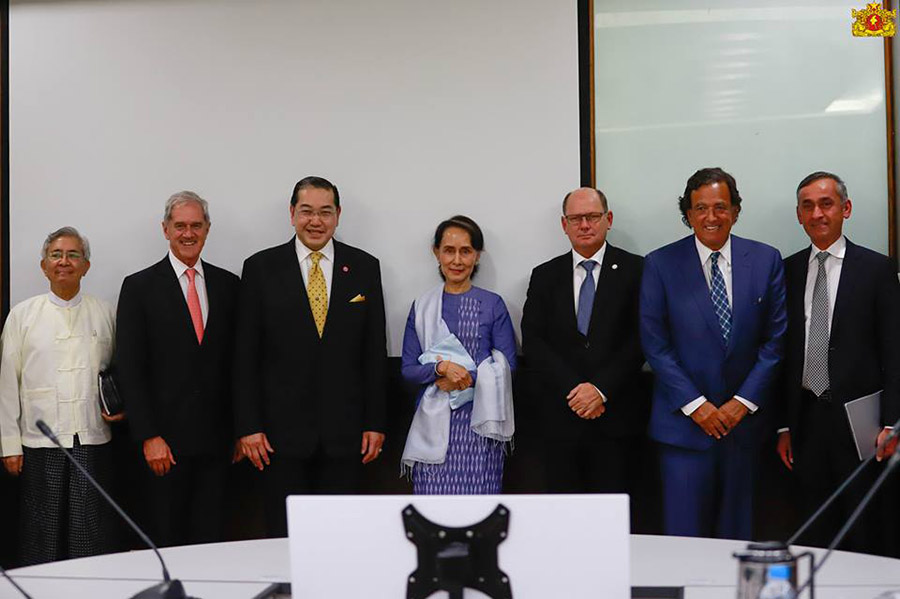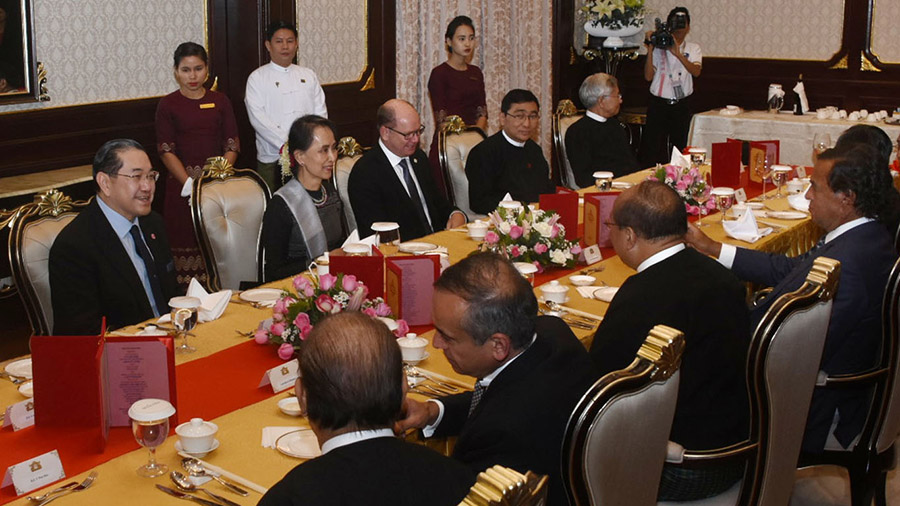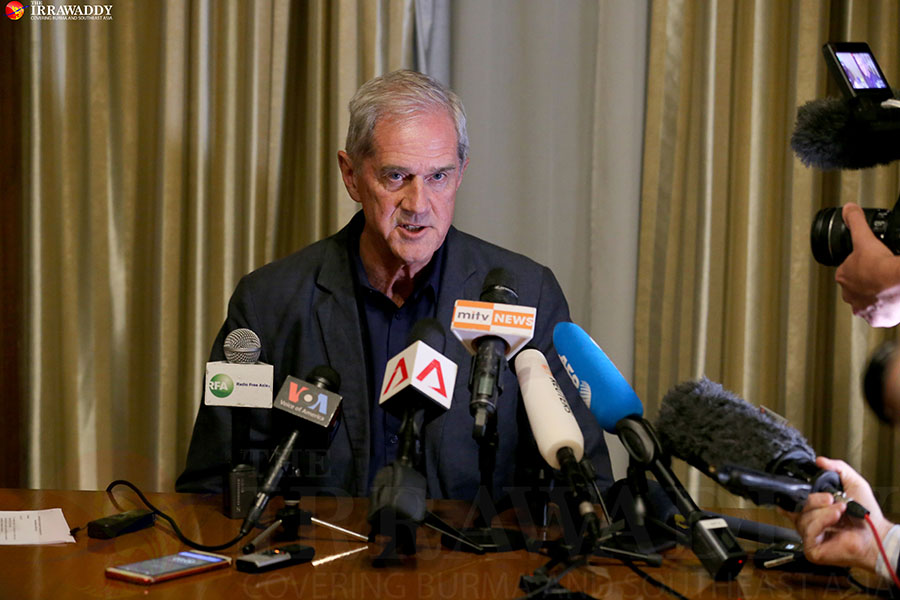In January 2018, former US diplomat Bill Richardson, who by that time had been a friend and international ally of Daw Aung San Suu Kyi for more than two decades, visited Myanmar as one of five international appointees to a panel that was supposed to advise her government on resolving the Rakhine crisis. His visit ended prematurely, however, when the ex-New Mexico governor abruptly abandoned his task and returned home. According to his fellow board members, Richardson had been denied a meeting with the home affairs minister at which he hoped to secure the release of two detained Reuters journalists, and vented his displeasure at Daw Aung San Suu Kyi in an undiplomatic manner, though she had no control over the Home Affairs Ministry and Richardson’s request was not within the scope of the advisory board’s work. He later appeared drunk and belligerent at a gathering hosted by the State Counselor. In February this year, after Daw Aung San Suu Kyi’s government was overthrown by the military, Richardson tweeted: “Because of Suu Kyi’s failure to promote Democratic values as Myanmar’s de-facto leader she should step aside & let others take the rein with international backing and support.” Ahead of his upcoming visit to Myanmar—announced on Monday—during which he plans to discuss delivery of COVID-19 vaccines and other aid, The Irrawaddy revisits this 2018 account of his disastrous trip that year.
YANGON — When State Counselor Daw Aung San Suu Kyi and former New Mexico governor Bill Richardson met again late last month, a public row was probably the last thing these two old friends expected.
Their friendship dates back to 1994, when she was under house arrest and he was one of the first visitors outside of her immediate family that she received. Since 2012, Richardson’s Center for Global Engagement has conducted multi-party political and governance training in Myanmar.
When Richardson was among five prominent international figures appointed to the Advisory Board for the Committee for Implementation of the Recommendations on Rakhine State last year, the 71-year-old was a natural choice. Given his long involvement with and apparent knowledge of Myanmar, his credentials seemed sound.
So expectations were high when the Advisory Board and State Counselor Daw Aung San Suu Kyi met for the first time on Jan. 22 at the Ministry of Foreign Affairs in Naypyitaw.
The board members, five local and five international, were meeting on the basis that all would come with an open mind, ready to listen to all perspectives and learn from them in order to formulate collective recommendations for the Implementation Committee over the next few months. The recommendations were to be made in the best interests of conflict-torn Rakhine State.
In a statement released after the meeting, the government said simply that “matters relating to the implementation of the recommendations on Rakhine State and the work plan of the Advisory Board were discussed.” The accompanying photographs show everybody apparently at ease, with Daw Aung San Suu Kyi in the center surrounded by the Advisory Board members, including Richardson, beaming warmly at the camera.

Behind the smiles, however, there was anger, surprise, recrimination and a sense of disrespect following an angry complaint from the former New Mexico governor to Daw Aung San Suu Kyi over the last-minute cancellation of his meeting with the home affairs minister, at which he had sought to discuss the fate of two Reuters journalists detained over alleged violations of the Official Secrets Act.
The board members, unaware that he had requested the meeting, were taken aback by Richardson’s complaint, diplomatic sources with knowledge of the meeting told The Irrawaddy.
“Adopting an angry manner towards Daw Aung San Suu Kyi, he protested that his meeting with the home affairs minister was not going ahead, as though she had something to do with it,” one of the sources said.
“No one should show disrespect or rudeness to a national leader, even when disagreeing with them,” this source added.
While she is not the president of Myanmar as she is ineligible for the office under the Constitution, Daw Aung San Suu kyi has been the de facto leader of Myanmar since her National League for Democracy party won a landslide victory in the 2015 general election.
At the advisory meeting, Richardson participated in the conversation but seemed preoccupied with the journalists, one of the sources said.
The State Counselor responded in a firm and clear way that the case of the reporters was not within the scope of the advisory board’s work.
“If he knew Myanmar well, he would know who controls the Home Affairs Ministry,” said the same source, referring to the fact that the ministry is one of the three military-controlled institutions in Myanmar over which the government has little or no authority.
Advisory Board chairman Dr. Surakiart Sathirathai told state media on Thursday that Richardson might have come with the preconceived goal of securing the release of the Reuters reporters.
“He did not raise that in the Advisory Board at all, but he raised it with the State Counselor. It is not in the mandate of the advisory board. The board was not consulted formally in the three meetings that we had,” he said.
After the meeting, Daw Aung San Suu Kyi invited the four other international board members — Richardson was excluded — to her home to say she was sorry that the exchanged had happened.
At a dinner later that night at Shwe San Eain Hotel, Richardson behaved badly and appeared drunk, according to three sources. He verbally attacked Dr. Surakiart, accusing him of not standing up for him. The State Counselor was present at the dinner.

“Richardson’s behavior at the dinner table was unacceptable,” said someone who attended the dinner.
“Daw Suu didn’t respond to his behavior at the dinner,” the source added.
Witnesses told The Irrawaddy that Dr. Surakiart found Richardson’s behavior unacceptable and told him to calm down.
After the dinner, Myanmar National Security Adviser U Thaung Tun was seen visiting the former governor’s room at the Thingaha Hotel for talks.
When the Advisory Board members left for Rakhine on Jan. 24, Richardson was nowhere to be seen. In fact, he was on his way to Yangon. On Jan. 25, he released a statement announcing his resignation from the board, which in his view was “likely to become a cheerleading squad for government policy” and adding that he was “extremely upset” at the State Counselor’s reaction to his request that she address the situation of the two Reuters journalists swiftly and fairly. He adds in the statement that “the absence of Daw Suu’s moral leadership on this critical issue is of great concern.”
“The board members heard of his statement after the visit to Rakhine State, which he didn’t attend,” one of the sources said.
In response to the statement, the Ministry of the Office of the State Counselor announced that evening that it appeared Richardson’s intent had not been to provide advice to benefit Rakhine State, “but to pursue his own agenda.”
“In view of the difference of opinion that developed, the government decided that his continued participation on the Board would not be in the best interest of all concerned,” the announcement reads.
Dr. Win Myat Aye, the chairman of the Committee for Implementation of the Recommendations on Rakhine State and Minister for Social Welfare, Relief and Resettlement of Myanmar, told The Irrawaddy that Richardson raised an issue not directly related to the Implementation Committee’s work.
“The advisory board is supposed to advise our committee, not on other things. We want people who can advise and help our implementation,” he said.
Richardson’s branding the panel as an instrument of “whitewashing and cheerleading” also prompted responses from the board members. At an urgently arranged press conference on Thursday, panel member Roelf Meyer said the meeting had been the first by the board members in Myanmar and they had not yet agreed to submit any advice to the implementation committee.

“Therefore, any statement about the Advisory Board ‘whitewashing’ or ‘cheerleading’ for anyone lacks complete legitimacy,” the former South African minister of constitutional development and provincial affairs said. A statement issued at the press conference said the board would offer its preliminary reflections as advice to the Implementation Committee.
On the same day, Surakiart said he thought Richardson’s characterization of the Advisory Board — which the governor had shared with international media — as “whitewashing”, representing or protecting the Myanmar government, was unfair.
“We don’t intend to be the cheerleader of the government or the lead cheerleader of the international community,” Surakiart said.
The Advisory Commission on Rakhine State led by former UN Secretary-General Kofi Annan released its final report with 88 recommendations in August 2017. The Committee for Implementation of the Recommendations on Rakhine State comprising representatives from the relevant ministries headed by the Union minister for social welfare, relief and resettlement has been implementing the recommendations. The Advisory Board was formed with national, regional and international experts on Dec. 14, 2017 to support the work of the Implementation Committee.
In comments that seem to backtrack from his accusations against Daw Aung San Suu Kyi, the former New Mexico governor said on Jan. 26 that she remains Myanmar’s best hope for change, and advised Western governments to continue to engage with her.

















